Bob Bradshaw’s a bit of a regular around these parts. We’ve reviewed four of his albums and this is his third contribution to our High Fives feature. His songs are exceptional and original and his albums are examples of sequencing a series of songs to create a coherent entity, particularly on his 2019 album “Queen of the West”.
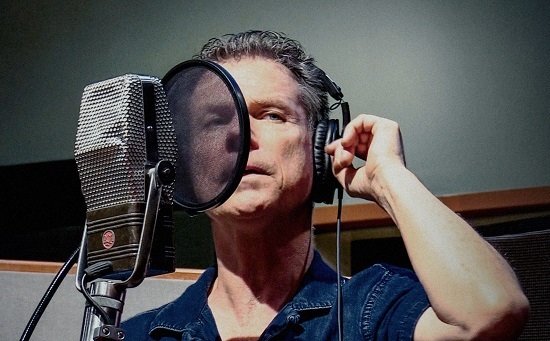
Podcasts were a life-saver for me over the past year and a half, especially music podcasts. Here’s my high five, with examples (sometimes drawn from previous years but I heard them for the first time in 2021).
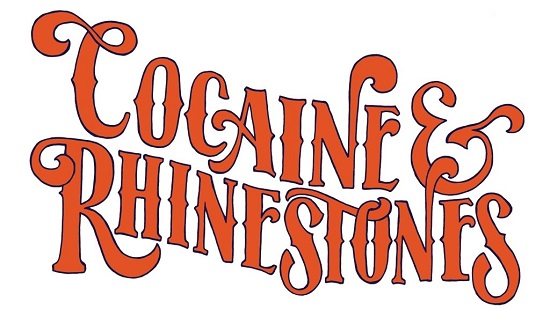
Cocaine and Rhinestones.
Tyler Mahon Coe’s wildly opinionated, rip-roaring podcast about the history of Country music is a trip. His use of sometimes obscure song clips to illustrate points is masterly. He’s devoting the whole of the present season to George Jones. This episode from the first season about Buck Owens and Don Rich is terrific:
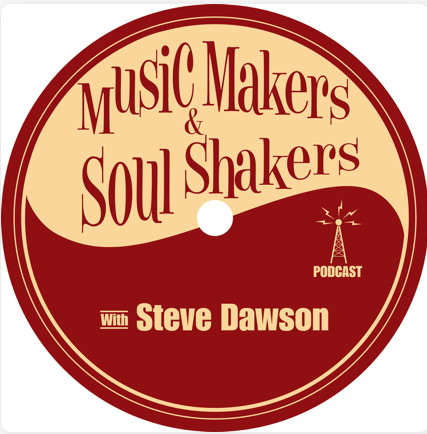
Music Makers and Soul Shakers.
Steve Dawson is a fine guitar player/producer himself and this is one of the best nuts-and-bolts podcasts for and about musicians I’ve heard. There’s some great stories in this episode with Marc Ribot:
https://www.makersandshakerspodcast.com/podcast/8-marc-ribot
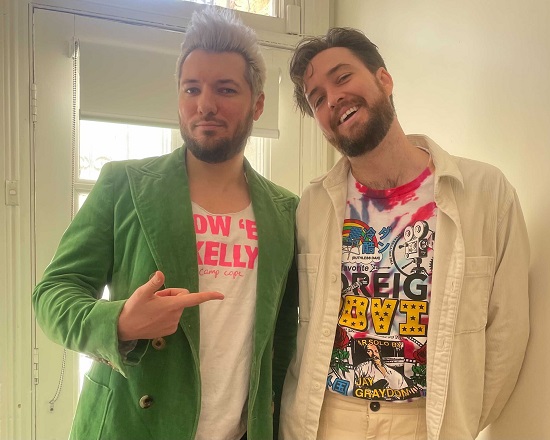
My Favorite Album.
Host Jeremy Dylan has interviewed Daniel Lanois, Mitchell Froom, and Max Weinberg, among others. In this episode the great Nick Lowe explains how he puts a live show together:
https://myfavoritealbum.libsyn.com/338-nick-lowe-breaks-down-his-live-show
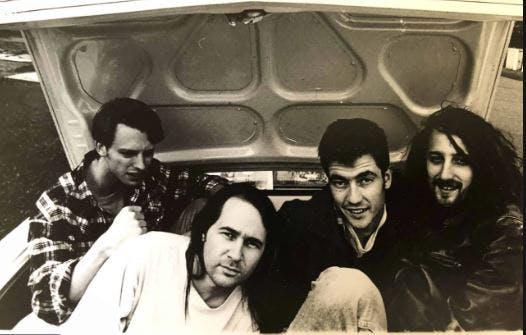
Love That Album.
Maurice Bursztynski’s wide-ranging, low-key approach is perfect for discovering new music, or revisiting old favorites. Steve Berlin, from Los Lobos, talking about their 2021 album ‘Native Sons’ is a good place to start:
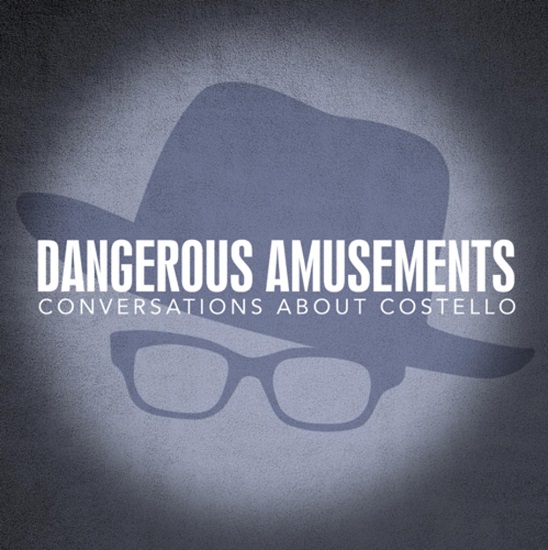
Dangerous Amusements: The Elvis Costello Playlist. Perhaps only Dylan or Bowie are worthy of this level of scrutiny (and there are podcasts about both that I don’t think much of.) Fellow musicians, journalists and music business folk discuss (with host Stu Arrowsmith) what Costello has meant to them over the years, and pick one song from each of the five decades Costello has been producing his idiosyncratic catalogue. There’s plenty good stuff in this interview with Glen Colson who did publicity and promotion for Costello in the early years:
https://podcasts.apple.com/il/podcast/glen-colson/id1535324499?i=1000527944399&l=iw
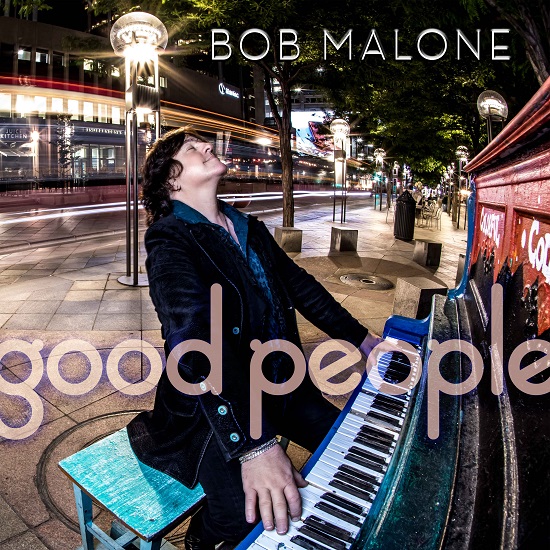
One thing you can guarantee with a Bob Malone album, it will be packed with musical talent. That starts with Bob Malone himself playing acoustic and electric pianos, organ, synth, glockenspiel, stomp box and tambourine; and he’s a pretty good singer in a raw rock/blues style. He’s classically trained, an accomplished writer and arranger and he has a day job (when we’re not in the middle of a pandemic) as keyboard player, accordionist and unwitting pyrotechnics target with John Fogerty’s live band. His solo work reflects his varied musical background, pulling in elements from classical, soul, blues, rock, funk and jazz into a glorious fusion that’s pure Bob Malone.
“Good People”, in common with a lot of recent releases is at least partly a lockdown project put together from recordings at various studios and has a couple of lyrical themes running through it; gratitude for the things that have seen us through the pandemic and a sense of loss for friends and family that didn’t make it through, for whatever reason. The latter theme is particularly important on “Good People”; Lavonne Barnett-Seetal of The Malonettes backing vocal team died in December 2020. Her stunning voice lives on and “Good People” is a fitting tribute.
There are eight original songs on “Good People” and three non-originals; I’m wary of using the word ‘cover’ after a conversation with the wonderful Galician finger-style guitarist, Iago Banet, who makes a powerful case for using the word arrangements instead. Either arrangements or interpretations would be more accurate for the three non-originals on “Good People”. The first reworking is a brave choice of the John Fogerty classic “Bad Moon Rising”. The menace of the original is emphasised by a piano riff that mixes “Come Together” and “Crossroads” and a slightly changed melody. Appropriately enough, it has a real New Orleans feel. Another brave choice is building the Peter Green-era Fleetwood Mac classic “Oh Well” around a turbo-charged piano riff replacing the guitar of the original. It’s a stunning response to everyone who ever told him that “Oh Well” was a guitar tune that wouldn’t work on the piano. And the final non-original, which closes the album, is the long-time live favourite “Tangled Up in Blue”, which is funked-up, rocked-up, Leon Russell-like, show-closing version of the Dylan classic that leaves plenty of room for piano and guitar solos – this studio version has solos from six different guitar players; yep, that’s right, six.
After interpreting the work of classic songwriters such John Fogerty, Peter Green and Bob Dylan, do the Malone originals match up? They certainly do. Bob’s songwriting on “Good People” reflects the times that we’ve lived through since January 2020. The message of the title song is really simple; there’s always reason for positivity because there are always good people around. In a turbulent year like 2020, particularly in the USA, it’s a message that many have forgotten; many thanks for the timely reminder, Bob. The beautiful ballad “My Friends and I”, with its sparse (mainly) piano backing, building up to a gospel choir finish, tells a story of loss that’s familiar to many of us over the last year. It’s an incredibly moving song.
As is “Empty Hallways”, stripped back to piano and strings. The pathos of watching someone slip away is emphasised by Bob singing towards the top of his range and it’s an emotional ride. The Malonettes backing vocals feature heavily again on “The River Gives”, a slow ballad about the danger of depending on unpredictable and dangerous natural resources; it might even be a metaphor for life itself. But don’t get the wrong idea about Bob’s own compositions; they aren’t all downbeat. The instrumental “Prelude and Blues” is an opportunity for Bob and the band to show their prowess in a gentle jazz/blues piece, while “Sound of a Saxophone” using the sax as a metaphor for jazz and music generally builds up to a big full band arrangement with strings and, of course, The Malonettes in full swing.
“Good People” is an album that captures the experience of the plague year perfectly and I think it’s his best yet. It’s a mix of remembrance, numbness, regret and, ultimately, recovery. It’s a bunch of songs that perfectly captures the experience of the last sixteen months and finishes on a note of pure defiance with joyous “Tangled Up in Blue” that you really need to see live. Until that happens, get your ears around this album and prepare for a treat.
“Good People” is released on Friday May 21st, until then here’s a little video for you:
 It’s quite a story; Michael McDermott’s short rise and relatively successful start to a career in the early nineties, through a long downward spiral ending in addiction and jail and, ultimately, recovery and redemption. His previous four albums “Six on the Out” (as The Westies), “Willow Springs”, “Orphans” and “Out From Under” cover those themes pretty comprehensively, although Michael McDermott isn’t showing signs of running out of inspiration any time soon. He’s a songwriter who’s equally at home writing pieces that are intensely personal, straightforward love songs, observational songs, fun songs and, on this album, a couple of powerful songs inspired by the state of America in 2020. Whatever he’s writing, he’s never less than totally honest and always completely believable.
It’s quite a story; Michael McDermott’s short rise and relatively successful start to a career in the early nineties, through a long downward spiral ending in addiction and jail and, ultimately, recovery and redemption. His previous four albums “Six on the Out” (as The Westies), “Willow Springs”, “Orphans” and “Out From Under” cover those themes pretty comprehensively, although Michael McDermott isn’t showing signs of running out of inspiration any time soon. He’s a songwriter who’s equally at home writing pieces that are intensely personal, straightforward love songs, observational songs, fun songs and, on this album, a couple of powerful songs inspired by the state of America in 2020. Whatever he’s writing, he’s never less than totally honest and always completely believable.
The furious rush of the title song opens the album, pulling no punches as it tears through the state of the USA today, melding the lyrical helter-skelter of “Subterranean Homesick Blues” with the musical punch of “Born to Run” in a scathing attack on the Trump vision (and we’re done with the Dylan and The Boss references now).
The musical stylings are what you would expect from a Michael McDermott album; there’s a lot of variety. From the headlong charge of “What in the World”, through the finger-picked guitar on “Positively Central Park” and “New York, Texas” to the Motown bounce of “Contender”. The album certainly isn’t one-paced and, as always, demonstrates Michael’s range and versatility. As ever the musicians do exactly what’s needed to get the message over, without ever sounding showy.
Lyrically, the album’s a step away from the quartet mentioned above. The title song and the heart-rending “Mother Emanuel” are both protest songs, while the rest of the album focusses mainly on a couple of themes; the post-addiction space that Michael occupies now, and an exploration of some of the events in his personal history that may have been triggers for the dark period. This isn’t about self-justification, it’s more in the nature of a warning to others of the treachery of that particular slope.
So, which songs pushed my buttons? Obviously, the title song with its stinging attack on USA 2020, including the unequivocal message: ‘It’s not to hard to see The Presidents’s a criminal’ is right up there. “The Veils of Veronica”, the story of someone with too few skins to deal with the world is heart-rending, and the gentle “Blue-Eyed Barmaid” turns the tables on the cliché of the customer pouring out his troubles to the long-suffering barmaid. With eleven new songs (plus a bonus of the acoustic demo of the title song), there’s so much to love here; the songs are intense and Michael’s vocal delivery is impassioned, as always. It’s a grim reality of the music business today that Michael McDermott is unlikely to become rich, but that won’t stop him making music and we’ll all benefit from that.
“What in the World” is released in the UK on Friday June 12th on Pauper Sky Records.
BTW, it passes the Will Kimbrough test as well; he’s on pretty much everything I’ve loved over the last five years and he’s also doing his thing here.
 Phil Burdett; the eternal iconoclast. The most characteristic line of the album for me is ‘antagonize a purist’ from the album’s closing song “Newport Electrics”. The song, and the message, are built around Dylan’s infamous electric performance at the Newport Folk Festival in 1965, although the intro hints at the Hendrix performance of “The Star-Spangled Banner”. It doesn’t actually typify the album; it’s twice as long as most of the songs and three times longer than some and it has a psychedelic, hippy-trippy vibe with Indian percussion and hints of Ravi Shankar’s influence. You can fill your boots checking out the Dylan references, but there’s more buried there in the story of how music constantly evolves in the line ‘the strummer’s fix is in’ – is it the frontman of The Clash or a general reference to three chords and the truth guitar players? You decide.
Phil Burdett; the eternal iconoclast. The most characteristic line of the album for me is ‘antagonize a purist’ from the album’s closing song “Newport Electrics”. The song, and the message, are built around Dylan’s infamous electric performance at the Newport Folk Festival in 1965, although the intro hints at the Hendrix performance of “The Star-Spangled Banner”. It doesn’t actually typify the album; it’s twice as long as most of the songs and three times longer than some and it has a psychedelic, hippy-trippy vibe with Indian percussion and hints of Ravi Shankar’s influence. You can fill your boots checking out the Dylan references, but there’s more buried there in the story of how music constantly evolves in the line ‘the strummer’s fix is in’ – is it the frontman of The Clash or a general reference to three chords and the truth guitar players? You decide.
As always with Phil Burdett albums, you can spend all the time you have unpicking the words and looking for the references. I’m not doing it for you, but I’m just saying it might be worthwhile. Phil will argue that lyrics aren’t poetry because they rely on the music to make them work, but let’s just say they’re written in a poetic style. We can probably agree on that.
“Folkmares” came out of a difficult time for Phil; he has a work ethic that won’t allow him to stop. If he can’t write songs, he’ll paint or write poems or find some other way of creating art. What’s certain is that it won’t be boring or bland: guaranteed.
It’s a home studio recording with Phil singing, playing guitars, keys, bass, percussion and harmonica, while Steve Stott (fiddle and mandolin) and Colleen McCarthy (vocals) supply the folkier elements and a more country, string band sound. Phil’s influences are many and varied and most of them poke their heads over the parapet at some point in the album’s fifteen (yep, fifteen) songs. It’s a nod to the folk tradition that almost a third of the songs on the album are in 3/4 time, and those are some of the most poignant songs. I bet you want to know what some of the songs are about as well.
The album looks back to an earlier time in Phil’s life, not through the rose-tinted sunglasses of nostalgia, but the telephoto lens of realism, with absolutely no filters. The songs are set in either central London (Soho, Camden, you get the picture) and south-east Essex (Basildon and Canvey). The London settings have the feel of a Patrick Hamilton novel fifty years on at the start of the Thatcher era (looking forward as well in “Albion Caustic”), with scenes in pubs and an interesting array of characters. There aren’t too many happy endings either.
The Essex songs are set in a slightly earlier and maybe more innocent period, shining a bit of light on a time of life where everything seems possible yet impossible at the same time. We’ll start there for favourites. “New Factory Hand” (in ¾ time) evokes with concise phrases the stark reality of working life in the late sixties and early seventies and how we escaped from it, while the song following, “From a Van on the Coryton Road” is set just before the Thatcher era capturing the drudgery of dead-end jobs around Canvey Island and again the escape, ‘When Friday rolled by we would lead our wage packets to drink’.
I’ve already mentioned “Newport Electrics” a very personal take on the history and hypocrisy (bit of Jane Austen there, sorry) of the folk scene while “The Last March” does the same for the march and demo movement of the mid-eighties and the ‘I was there’ pose. You could update it for 2020 and call it “The Last Petition”. While we’re with the stupid ideas, the busker’s anthem “Flatpicking Sorrows on Borrowed Guitars” could be filmed by Wim Wenders as “The Busker’s Hatred of Brown-Eyed Girl”. Just sayin’.
What else? The packaging of course. Phil likes to include a lyric booklet and this time the photography (by Steve Stott and Rob Shaw) and the design, layout and graphics (by Steve Stott) combine to create a perfect setting for the lyrics. Bloody good job all round, I say from the Southend massive and a namecheck for John Bulley because I don’t want to leave him out.
While we’re all going stir-crazy, why don’t you treat yourself to a big helping of lyrics that will actually make your brain work and some really interesting musical settings.
“Folkmares” is out now and it’s available here. You won’t spend a better tenner before the lockdown ends.
Bit of a video taster before you go? Thought so:
 A producer, a photographer and two musicians walk into a pub. Sorry, there isn’t a punchline to this; it’s just what happened. A quick pre-Christmas beer with some music business friends to chew the fat; what do you think we talked about? As always with these semi-unplanned sessions something good came out of it. We’ll leave it to Graeme Wheatley, bass player and songwriter with the band Deep Blue Sea to tell the story, enhancing it with some music trivia. You might want to start this piece whenyou have about an hour to spare because it’s a bit addictive, especially after Riot Towers made a contribution,
A producer, a photographer and two musicians walk into a pub. Sorry, there isn’t a punchline to this; it’s just what happened. A quick pre-Christmas beer with some music business friends to chew the fat; what do you think we talked about? As always with these semi-unplanned sessions something good came out of it. We’ll leave it to Graeme Wheatley, bass player and songwriter with the band Deep Blue Sea to tell the story, enhancing it with some music trivia. You might want to start this piece whenyou have about an hour to spare because it’s a bit addictive, especially after Riot Towers made a contribution,
Sitting in The New Cross House pub the other night with Allan McKay (something that could very easily become habit forming), we were talking about his series of guest articles “High Fives” in Music Riot – sign up now if ya haven’t already!
I’ve written a few before and always like rambling on about whatever, so I was happy to quickly volunteer to write one for this Christmas – even before Allan gave me my first pressie of the year – even if I had no idea what to waffle on about.
We were with Iago Banet, a guitarist from a band that I’ve heard are not that bad and we were talking about a gig we did a few weeks ago. Our singer, Dre Smith, had lost her voice and we were doing the gig as a 3 piece – playing songs we’d never played before. I proudly boasted that I’d sang the entire lyric to “Blinded By The Light” by Brucie without a single rehearsal. Allan asked if I liked Manfred Mann’s version or the original best, then Iago reminded me that after 3 attempts we’d had to abandon “All Along The Watchtower” because I kept getting the first line wrong!!! Pride comes before…
Anyway, this conversation led to the topic of this High Five.
Five covers that I think are better than the original.
Only my opinion here – but when I got to thinking about it – there’s maybe 20 or 30 I could muse about. So, I thought I’d kick it off with two people who I consider to be un-betterable – but concede that in these two occasions, they are bettered.
Song 1
All Along The Watchtower – Bob Dylan – Jimi Hendrix
OK, if you know me at all, you may have heard me at sometime mention the name Bob Dylan. He’s the cat, the verbal acrobat-tery, the lyrical dexterity and temerity in all sincerity. A couple of weeks ago we were playing Bude R&B Festival, which involved a good 4 hour drive back and forth. Amanda Dal, our wonderful drummer, asked me, unprompted, to play the three albums Bob recorded in 1965 that “invented Rock Music as we know it”. Much to Iago’s horror. So we had a great journey back and forth listening to Bob. It’s Amanda’s turn next, so I am going to get 4 hours of singer songwriter LP. The fact that she’s a ringer for Bob makes me favourable disposed to her from the get go – so – I’m ok with this!
Anyway, some people say (fools that they are) that any cover of a Bob song is going to be better than Bob’s version. BUT THEY ARE WRONG!!!! This has only ever happened once in the whole wide universe since the beginning of time. And only one person could a done it. Jimi. Y’know, I’d love to be able to wipe the tape and hear Jimi’s version of Watchtower again for the first time. Can you remember that moment? I can’t. But listen to it now. The swagger, the invention, the sass, the sheer coolness. Four minutes of perfect cool. If Jimi hadn’t recorded it, would we remember the original? Was it just a fairly average track on a subdued and pared back album from Bob who might have been wondering at the time where he was going next. Recorded in 1967 after the “fall” it was a total turn away from the more blues inspired electric albums and a return to his more folkie side, but Jimi took this track, rocked it up, funked it up and delivery to my mind one of the greatest little guitar pop songs of all time.
Oh, BTW, the title of Bob’s album, John Wesley Harding. It was named after a Texan outlaw of that name – only they spelled it wrong!!! He was called John Wesley Hardin.
Compare and contrast:
Song 2
Nothing Compares 2U – Prince – Sinead O’Connor
I was a big Prince fan. Still miss the guy. He might have had demons and might have been just a tad obsessed but look at the catalogue of pop songs. Inventive, fun, joyous, rude, rock and raunch and lovesexy. He made pop a bit dangerous, a lot of fun and a lot of cool – combined a bit of Jimi, a bit of Marc, a bit of James Brown and a lot of genius. Until Sinead covered this song I would not have thought anyone could touch the little chap at his own game. I kinda thought Prince songs were indelibly stamped with Prince’s logo. You can’t touch this….
I wuz wrong. The frailty and fragile nature of the song fits Sinead and both somehow meld. She is the song, the song is her. That just doesn’t happen very often – if at all. That revolting phrase “you owned it” churned out on brain dead TV talent shows ad nauseam for once applies. You can’t think of the song without thinking of Sinead and vice versa. They might be so entwined that it overshadows her career.
OK, that’s two down and just to sum them up, nobody else has done a cover of a Prince song better than Prince and ditto Bob. Argue away, I’m not listening.
Compare and contrast:
Song 3
With A Little Help From My Friends – The Beatles – Joe Cocker
This is weird. The Beatles FFS? The greatest band ever. The greatest song writing partnership of the 20th century. The band that wrote the book (and the sequel). Have you heard some of the covers? “Hey Jude, Hey Bing”? Trust me, it was an album. My dad had it. Can you imagine the scene in our house? He was a jazz musician and I think he made this one attempt to be down with his son. He’d spent some futile time trying to tell me that all of this pop music stuff was nonsense and real music would eventually come into its own and Benny Goodman, Duke Ellington et al would be on Top of the Pops (Pops in this case being hep cat chat for Dads). Suffice to say most covers are cheesy in the extreme or just for shock value with nothing of value added. From Matt Monroe to Siouxsie Sioux. But, Joe? That voice. That presence. That simple honesty and stripped back truth. It’s a song, dare I say, that Paul didn’t really think was the Dog’s Bs so he suggested that Ringo sang it as a little bit of fun “What would you do if I sang out of tune?” and the whimsy fitted the feel of Sgt Peppers. But it was far from a stand-out track.
Now, fast forward a mere year or so. On stage at Woodstock and Joe says “the title of this song says it all”. The song is imbued with something more. A part of the hippy dream is captured in the performance. It’s a time piece. Oh and that voice? Come on. Just go have a listen. Band ain’t too bad either.
Song 4
Respect – Otis Redding – Aretha Franklin
Like Joe, this cover takes the song into places the original didn’t. Like the others too I guess. But with this one, you start pretty high up – with that voice, Otis. A voice that can quite easily make you cry. My Girl? Try A Little Tenderness? I Been Loving You Too Long? I’m tearing up now. And I’m a tough guy…
But Aretha takes a lyric that just might veer towards a bit misogynistic these days – y’know, man works all day – comes home to little lady cooking for him and expects a bit of R – E – S – P – E – C – T – and she makes it the first bona fide feminist mega hit defining moment of the decade. Oh yeah, and it was her major first hit after 10 years fighting against “the man”!!
What Aretha did changed the world. A cover version of a pop song changed the world? Yes, that’s what I said. Made a massive difference to the feminist movement and the civil rights movement. The impact of this little pop song can’t be ignored. That’s how deep my love is.
Oh, BTW, Otis didn’t really like the cover – but learned to live with it when the dosh rolled in – and also – listen to his version – most people think the lyric “R – E – S – P – E – C – T find out what it means to me” is part of the original.
Song 5
Girls Just Wanna Have Fun – Robert Hazard – Cyndi Lauper
For years I’d thought Prince wrote this especially for Cyndi. Someone told me some Fake News and I never questioned it. It’s a great song and it seemed believable. It’s my wife’s favourite “getting ready for Friday Night” song – so I had to include it for her.
There’s not a great deal to say about it other than, in Cyndi’s hands and voice, it’s perfect pop. In Robert Hazards? Well, have a listen to the song below. My main question is, How did Cyndi hear this very very average song and say “I can make this song a mega hit that will last generations and become Graeme’s wifes’ favourite “getting ready for Friday Night song” for all time”? I dunno the answer but one thing I will point out is, the song lasts 2 minutes and 30 seconds and the actual track lasts 4 minutes and 30 seconds. And by strange coincidence, when my wife says she’ll be ready in 15 minutes… you can fill in the rest.
Just before I trot off to have a mince pie, there were a couple of things I considered but rejected and hopefully some of these will incite you to invective 🙂
- Leonard Cohen covers – it’s easy to say other people sing them better than Lenny. That’s not the point. We can all say a photograph of a tree looks more like a tree than a Van Gogh painting of a tree. I don’t know where I’m going with that – other than Lenny is the Van Gogh of pop – funny, sad, dark, deep, tortured and Chaplinesque – there’s a crack in everything – that’s how Lenny gets in. I like his cracks. In his house there are many flaws – all of them interesting.
- Led Zeppelin – when you actually claim to have written all your covers yourselves – it doesn’t apply.
- Anyone covering Tom Waits with a gravelly voice – don’t be silly (Sir Rodney).
- Anyone covering Tom Waits with a lovely voice – as above.
- The Blues – it’s totally impossible to compare Crossroads – Robert Johnson to Cream. Both are wonderful in their own way – and I bet you can think of lots more examples. So, off you go, your challenge is now to name 5 blues songs that have brilliant originals and brilliant – but significantly different – covers.
Many thanks to Allan for allowing me to stop work for 3 hours to write this 🙂
Have yourselves a merry little Christmas, if the fates allow.
Cheers
Graeme
Written before the election December 2019 (I might not be in such a frivolous mood after that).
Sorry Graeme, but we need to have the last word here (not about the election, not even going there), especially after squeezing in two High Fives in one piece, but we did mention another song, which was a band covering their own song. Thin Lizzy’s “Nightlife” version of “Still In Love With You” should have pushed all the buttons as a duet between Phil Lynott and the wonderful Frankie Miller, but it was a bit of a mid-tempo plodder. Someone obviously worked out that it was a potential anthem, slowed it down, stuck a truly wonderful Brian Robertson solo in there and, voila, rock classic.
 Buford Pope’s American influences shine through on “The Waiting Game”. His introduction to American music was Bob Dylan but the most obvious comparison vocally is the high register vocals of Neil Young. There’s a reference in the album’s second song, “Hey Hey Aha”, to the difficulties of songwriting (and a subtle nod to Shakey again) and writer’s block, but the songs all worked out fine in the end and the calling card for “The Waiting Game” is the way they have been arranged. And that’s apparent from the very start.
Buford Pope’s American influences shine through on “The Waiting Game”. His introduction to American music was Bob Dylan but the most obvious comparison vocally is the high register vocals of Neil Young. There’s a reference in the album’s second song, “Hey Hey Aha”, to the difficulties of songwriting (and a subtle nod to Shakey again) and writer’s block, but the songs all worked out fine in the end and the calling card for “The Waiting Game” is the way they have been arranged. And that’s apparent from the very start.
“America” (a lyrical co-write with Mark Drake) is the collaboration that Neil Young and The Blue Nile haven’t quite got round to yet. It’s an atmospheric love song to America with a big bassline and a new frontier theme with songsters replacing pioneers. The high tenor range of the voice, the melancholy subject matter and the country-rock feel of “Hard Life” make vocal comparisons with Don Henley difficult to avoid, but it’s difficult to see how that’s a bad thing. I mentioned arrangements earlier and the most innovative has to be “A Hundred”.
The minimalist production is built around a bass drum on one and three and a layered handclap on two and four which repeats remorselessly throughout the song as the blues builds up with the addition of bass and banjo. It hints at the foot stamps of Brian May’s percussion innovation for “We Will Rock You” (a reference you might not expect to hear on an Americana album). Incidentally, a country, honky-tonk reworking of the song, listed as “Ninety-Nine” closes out the album.
It’s the kind of album that you get when an someone without the baggage of a ‘scene’ or ‘movement’ to contend with (living in a remote part of Sweden) can concoct by taking original American influences and subject matter and melding them with elements from outside this genre to produce something that’s unique. It’s an intriguing listen.
“The Waiting Game” is out now.
 Getting to Birmingham by boat is a bit of a struggle. You have to cover a lot of water the day you set out, as you have quite a few miles of ‘badlands’ to get through before you reach the ‘safety’ of the city centre and Gas Street Basin, which is extremely lovely. Not to mention a steep watery climb up to the summit almost underneath the city itself, which in heavy rain, constitutes something of a challenge. But it is extremely lovely in the way the BBC think ‘heritage’ is really lovely and consequently it is worthwhile getting slightly off the beaten track once safely moored up and in possession of your weekly spending money.
Getting to Birmingham by boat is a bit of a struggle. You have to cover a lot of water the day you set out, as you have quite a few miles of ‘badlands’ to get through before you reach the ‘safety’ of the city centre and Gas Street Basin, which is extremely lovely. Not to mention a steep watery climb up to the summit almost underneath the city itself, which in heavy rain, constitutes something of a challenge. But it is extremely lovely in the way the BBC think ‘heritage’ is really lovely and consequently it is worthwhile getting slightly off the beaten track once safely moored up and in possession of your weekly spending money.
About 600 yards off said ‘beaten track’ stands The Prince Of Wales, an old-school city boozer selling pies, pints and on occasion, there’s a ‘turn’, often at slightly odd times of day and it is with some surprise we stumbled upon a spirited, reggaefied version of Bob Dylan’s “I Shall Be Released” pouring out of the door. Intrigued, in we went, to be confronted by a pretty much full house of late Sunday afternoon drinkers all giving it plenty and a six piece band (on average) grooving away in a most delightful way. Pete Hyde and The Vieillards may be past the first flush of youth – indeed ‘Vieillards’ are old folks, rather than some strange mythical wossname born on the bayou, but they are warm, sinuous and very much ‘alive’ live musicians. I couldn’t help but feel like I was watching the living embodiment of the lyrics to Dire Strait’s “Sultans Of Swing” as this bunch weaved effortlessly through reggae to blues standards such as “The Thrill Is Gone”, classics like “Summertime” and some rock n roll standards, many illuminated with fine, fruity saxophone fills provided whilst said musician wandered off to the bar, almost as an afterthought whilst ordering a round. Indeed, at one point he was interrupted mid-noodle by someone who had just walked in off the street to enquire where the bogs were (note to person; if you’re going to creep into a pub to enquire the whereabouts of the rest room without purchasing a beverage, perhaps best not to broadcast this by interrupting a band member whilst about their business, even though your business may appear equally pressing) and evocative, rich keyboard work reeking of Booker T Jones at times, Dr John at others, shades of Georgie Fame also.
And not just the flipping obvious in the repertoire. As well as Van Morrison’s “Bright Side of the Road” which is very easily played badly but in this case wasn’t, we are treated to his lesser known but equally lovely “Cleaning Windows”. And the crowning glory for me, Ry Cooder’s magnificent “Little Sister”, complete with that wonderfully ‘aged’ and rubbery guitar sound and fabulously complimentary harmonies.
One of those marvellously ‘accidental’ Sunday gigs where you really didn’t need a drink to appreciate what was going on – but it was very thoughtful of the management to provide some. Bit more Ry Cooder and perhaps some more Toussaint, and maybe some Lee Dorsey perhaps, would have been nice but they’re musicians, not a human jukebox. And between sets, how wonderful to hear Smokey, The Crusaders, The Temptations, etc., underlining the importance of the stuff played in and around a live band’s set to maintaining a groove. And they played for a couple of hours or more. Sultans of Swing, in very deed.
4 Stars and a bit.
 One thing to say right from the start, Danny Schmidt is a superb songwriter; a songwriter’s songwriter if you like, practised in the alchemy of creating gold from, well, algebra, statistics and string theory for a start. Unlikely base metals maybe, but Danny Schmidt’s no ordinary singer-songwriter; he’s a poet, a physicist and a metaphysicist. Keith Richards might claim that you just have to pull songs out of the air, but Danny Schmidt is proof that great songs can be honed and crafted till they shimmer if you have the insight, the inspiration and the skill.
One thing to say right from the start, Danny Schmidt is a superb songwriter; a songwriter’s songwriter if you like, practised in the alchemy of creating gold from, well, algebra, statistics and string theory for a start. Unlikely base metals maybe, but Danny Schmidt’s no ordinary singer-songwriter; he’s a poet, a physicist and a metaphysicist. Keith Richards might claim that you just have to pull songs out of the air, but Danny Schmidt is proof that great songs can be honed and crafted till they shimmer if you have the insight, the inspiration and the skill.
Danny Schmidt’s songs cover a wide range of subjects and styles; he’s convincing with the wordy, technical songs (the album’s title track, for instance) and also has complete mastery of the personal, confessional style that tops and tails “Standard Deviation”. The album has wonderful examples of both of those styles; the title track combines a slightly unconventional love story with an interest in various modern scientific concepts. Also, and Danny doesn’t labour this in the lyrics, he highlights the differences between the relationship between the statistical concept of the normal distribution and the day-to-day us of the word ‘normal’. The lyrical beauty of the song is enhanced by a gorgeous arrangement building up to the entrance of the celestial choir towards the end of the piece.
The song that tops the album, “Wait Til They See You” is exactly the kind of song that a doting father writes about his miraculous and beautiful baby daughter while the closer, “We Need Another Word” asks a serious question about whether the word ‘miscarriage’ is appropriate as a description of a harrowing personal ordeal faced my millions of women every year. I think he has a point. “Bones of Emotion” is an exploration of the of the turbulent undercurrents of a family gathering at Christmas, while “Newport ‘65” is a deceptively straightforward look at Dylan’s move away from conventional acoustic folk, which highlights the dangers of being seen as a prophet – acolytes crave certainty and react badly when that certainty is taken away.
“Standard Deviation” is a great example of the songwriter’s art; songs covering a wide variety of styles and topics set in arrangements that make them sparkle and shine.
The album is released in the UK on Friday March 29th on Live Once Records (LOR CD 10) and Danny will be touring the UK in May.
Meanwhile, just bury yourself in this:
It’s the fourth day of the 2018 High Fives series and the contributions from songwriters and performers are starting to come in. it’s always good to have something from Graeme Wheatley, bass player and songwriter with Deep Blue Sea and all-round nice guy. It’s great to see that Graeme has completely embraced the High Five brief – just five of absolutely anything. And there’s even some Shakespeare for you as well. All photos courtesy of Laurence Harvey.
 What subject can I pick? Allan will have the gigs sewn up for sure. I think I did albums and musicians before. I guess my answer is easy – it’s what I am doing right at this very moment. Or rather, it’s what I should be doing – but I am letting Allan’s request for an article distract me. Song writing.
What subject can I pick? Allan will have the gigs sewn up for sure. I think I did albums and musicians before. I guess my answer is easy – it’s what I am doing right at this very moment. Or rather, it’s what I should be doing – but I am letting Allan’s request for an article distract me. Song writing.
I first thought I’d write a note about my favourite 5 songwriters – but none of them have written anything new this year – and it’s 2 years since Leonard decided to write no more. So I thought I’d write a little about some Deep Blue Sea songs – it might be self indulgent, it might be a bit arsey? But surely it’s not as bad as scoffing an entire tin of Quality Street tho of course, I might do that too.
2018 has been a year of writing songs. Deep Blue Sea started to write as a unit when Dre and Amanda joined Iago and me in March 2018. In the space of 3 months we got together, did a few gigs and then recorded a live album featuring 5 songs that were written in that 3 month creative burst. Since then we’ve probably written about 15 more and we’re in the studio over December and January recording them for a new album in 2019.
Seems like a good idea to take a look at the 5 songs we wrote over that 3 month period. I’m hardly qualified to go into great depth on the music – and the lyrics are totally open to interpretation – but here goes a few words of waffle and title tattle – feel free to disagree. One over-arching observation. A band is a relationship. Relationships start with an intensity. These songs happened fast and are part of the glue that we’ve created – part of the DNA of DBS. I hope you like this little tale –
“A tale told by an idiot, full of sound and fury, signifying nothing.”
Rock Star Status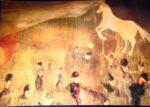
Oh. Look at the stars up in the sky – My oh my
Look at the stars waving goodbye – Bye bye bye
Everybody here gets Rock Star Status – There’s no point now cos everbody’s famous
It’s nobodys fault But everybody hates us – It’s nobodys fault But nothings gonna save us
Everybody here gets Rock Star Status – A little applause and admiration
15 seconds of adoration – A lethal dose of adulation
Oh. Look at the stars up in the sky – My oh my
Look at the stars waving goodbye – Bye bye bye
Everybody here gets Rock Star Status – A pocket full of dreams and a ticket to Vegas
Hold on tight, you’re making the papers – O/D-ed celebrities are coming back to plague us
Everybody here gets Rock Star Status – VIPs in the Palace of Gratis
Take a little taste of the breathing apparatus – A finger on the pulse of the phallic operators
Oh. Look at the stars up in the sky – My oh my
Look at the stars waving goodbye – Bye bye bye
All we ever wanted was Rock Star Stuff – Everything now and it’s still not enough
Keep it coming cos we’re Rock Star Tough – Keep it coming til we choke on the stuff
Oh. Look at the stars up in the sky – My oh my
Look at the stars waving goodbye – Bye bye bye
So, Iago had this little Stonesy type riff- except as always with Iago – the chords were weird, wired and inspired. I’d been to an art exhibition in Dulwich and there had been a painting I really liked. Couldn’t afford it of course, but there were some postcards of the painting free – so I took a couple. Got home later that day and looked at the picture. Surreal dreamscape with horses. Turned it over and the title was “All I ever wanted was Rock Star Status”. I knew I had a title. The lyrics flew onto the page – it was a job stopping them. When Dre started working on the melody she noticed nothing really rhymed very well. There’s the language barrier for you. You say Status and I say Status!!! We compromised. What’s it all about? You tell me. I’ve been wondering. Oh, by the way, the artist, Kate Pritchard, who painted the picture, came to see the band at our gig last week at 100 Club!!! Circle complete. That was a total new experience for us both – and a really good one. Life eh?
Manic Pixie Dream Girl
Dark days take pride of place – For the little girl with the smiling face
A smile that hides – uncertainty
If her face seems so serene – Her hands betray a silent scream
And doubts about – her sanity
Worlds of distorted noise – Distraction drinking drowning boys
Shaking shame – and regret
Touch and hold and then let go – Of something in her overcoat
One thing not – broken yet
The manic pixie dream girl is swaying in the breeze
Washed by winds and tossed by tides from all the seven seas
The manic pixie dream girl is shaking like the leaves
Crossed by stars and chained by dreams of
Never being free
Black clouds hang down the face – of the little girl with silent grace
Reaching out for – sanctuary
Beneath the stones and dusty bones – words are falling all alone
To mourn – dignity
Might have seen might have beens, hopes are only dusty dreams
Bitter pills – memory
Moments passed nothing lasts, out of reach fading fast
Time kills – vanity
The manic pixie dream girl is swaying in the breeze
Washed by winds and tossed by tides from all the seven seas
The manic pixie dream girl is shaking like the leaves
Crossed by stars and chained by dreams of
Never being free
She’s
Thrown in all directions – blown by recollections
The manic pixie dream girl is swaying in the breeze
Drawn to all confections – torn by rare infections
The manic pixie dream girl is shaking like the leaves
The manic pixie dream girl is swaying in the breeze
Washed by winds and tossed by tides from all the seven seas
The manic pixie dream girl is shaking like the leaves
Crossed by stars and chained by dreams of
Never being free
“I have almost forgot the taste of fears; The time has been, my senses would have cool’d To hear a night-shriek.”
Trev Turley writing a review of this song in Blues In Britain called the groove “invisible reggae” – I dunno what it means – but I like it 🙂
I was driving along in the old band van awhile back, listening to the radio. There was a book review programme on and people were talking and I wasn’t listening until someone said “oh, her, the classic Manic Pixie Dream Girl, it’s no more than you’d expect.” I knew I had a title for a song, but I didn’t know what the person meant by “no more than you’d expect.”
I got to thinking about a friend of mine who I am very happy to say is on the other side of the tunnel from her period as a manic pixie, but there was a time when several friends and I worried about this frail and beautiful butterfly. We saw her floating, we saw her shine and shimmer but we couldn’t do much to shelter her from the storms inside. She was fighting battles we had no weapons.
I wanted to try and capture the idea of a moment in time with her – where words don’t always mean what they appear to mean, where things tail spin off into other moments – the uncertainty at the core of a person in turbulence. I’m so glad she’s still my friend. And in the weirdest ways the manic pixie dream days are not over but no longer laced with the threat of a long, long night.
The Thrill of It All
The little girl doesn’t know
If she’s alive anymore
No sense of fun – nowhere to run
Once there was a time
Happiness was no crime
Now she’s in a cage – No passion or rage
As the light starts to fall
She’s walking on the edge
Of everything unsaid
It hurts just to feel, doubt what is real
Standing by the side
Of the days of her life
See the falling tide – what’s left behind?
As the light starts to fall
I know she recalls – I know she recalls
I know she recalls – The thrill of it all
I know she recalls – I know she recalls
I know she recalls – The thrill of it all
Here under the Sun
Hopelessly undone
How can feelings grow – From seeds she didn’t sow
Mem’ries made of pain
She cannot explain
A hand in the flame – the nameless game
As the light starts to fall
know she recalls – I know she recalls
I know she recalls – The thrill of it all
I know she recalls – I know she recalls
I know she recalls – The thrill of it all
This song grew in the playing. Iago’s guitar solo can take us off anywhere. When Amanda got into the song and the feel of it – she started to push things and take risks. If you listen to the live album, there’s a few moments where we could all really fall on our collective bums as we get perilously close to the edge. I think that’s the one of the great things I love about playing in the band – we are a band. And I think we all love the risks. Nobody stays calm – we’re all in it together. Dre’s melody to the chorus transformed this song. It would not have been on the album if she hadn’t have lifted something special out of the void. I co-wrote the lyric with Emma Holman. I think she put some truly heartfelt emotion into the words and thank her for sharing.
Hole in your Soul
It’s only when u get here u know this place exists
you’ve taken the wrong turn round every bend and twist.
u finally hit the bottom you have one more thing to learn
no going back, this is the point of no return
When love has lost
There’s a cost
There’s a hole in your soul
When the vital spark of life in ev’ry leaf and tree
Is passed un-noticed By eyes that do not see
You look into the darkness – seek solace out of light
Cut out all sensation – Taste and touch and sight
When love has lost
There’s a cost
There’s a hole in your soul
I climbed the highest mountain and looked down to the sea
I saw the miracle of life spread out in front of me
I look on all the beauty of night becoming day
When I saw that nothing moved me, I turned and walked away
You turn away from friends turn away turn away
Close down your heart. Nothing more to say
When love has lost
There’s a cost
There’s a hole in your soul
I climbed the highest mountain and looked down to the sea
I saw the miracle of life spread out in front of me
I look on all the beauty of night becoming day
When I saw that nothing moved me, I turned and walked away
When love has lost
There’s a cost
There’s a hole in your soul
“I begin to be aweary of the sun, And wish the estate o’ the world were now undone.”
It will come as no surprise to anyone who vaguely knows me that I am a massive Bob Dylan fan. This lyric started life as a Bob type song. The bridge part “I climbed…” – it’s not often that I will say something like that – something I haven’t done. I haven’t climbed the highest mountain to look down to the sea – and I’m prepared to wager that Bob hasn’t either – but it’s something he would claim to have done. So if you are going to tell a porkie – tell a big one, like Bob 🙂
Lyrically, for me, it’s a dark night of the soul song. Make of it what you will. Sara (our previous drummer – from The Pearl Harts) liked this one a lot – said it reminded her of Muse. The line “This is the point of no return” was meant to have two meanings – but I realise one meaning is far more obvious than the other and unless I add an explanatory note, no one will see it. And who would be so tedious as to add an explanatory note? Duh!!!
All Our Yesterdays
Welcome to the great escape
No one’s gonna stop this big break
There’s a raging battle
Every single night
Someone’s give me half a chance I’m gonna set this place alight
So long to my sad old days
Don’t look back to those old ways
There’s a storm inside
Burning up my soul
Someone give me half a chance to make my life a whole
And the radio plays songs from a different day
Sing that song all night long wash your blues away
And the DJ plays All our yesterdays
So we say This one’s for the runaways
Welcome to this point of view
Somethings changed somethings new
Now we’re out the dark
Out into the sun
Some will stay and fade away but we are gonna run
And the radio plays songs from a different day
Sing that song all night long wash your blues away
And the DJ plays All our yesterdays
So we say This one’s for the runaways
And the DJ plays
All our yesterdays
So we say
This one’s for the runaways
So we say
This one’s for the runaways
“To-morrow, and to-morrow, and to-morrow, Creeps in this petty pace from day to day To the last syllable of recorded time, And all our yesterdays have lighted fools The way to dusty death.”
This wee tale started life as a song I was writing with the ace guitarist Chris Walker while Chris helped keep the band afloat for a year or so, for which I am eternally grateful. It wasn’t easy keeping things going – but we had commitments to honour and he’s a great guy. We also had a dear friend Louise Davies making sure we kept the flame alight – she didn’t give either of us any other option. I nicked my own lyric to drop into Iago’s infectious confection of rockabilly roll. A song called All Our Yesterdays with a rock and roll groove seems to be made for each other and it’s kind of as close as we get to a bit of light relief. This is Dre’s favourite dancing song – which is great for her – cos she can dance – but the other two people standing on stage beside her both have 2 left feet!! We try not to fall over. That is the lesson for today folks. Dance, laugh, be happy, it could be so much worse. Keep your head in the clouds and your feet on the floor and…..try not to fall over.
(all the quotes are from one small page of Macbeth
– the Scottish play – a nod to the McKay:)
 The difficulty is knowing where to start here. Michael McDermott’s output over the last two years as The Westies and a solo artist has been prolific and profound. Making up for lost time; who knows? Michael’s four years clean and sober; 2016’s “Six on the Out” and “Willow Springs” made references to his lost years, while “Out from Under” tells the whole story from degradation through rehabilitation to redemption, pivoting around the album’s central song “Out from Under” and the decision to take responsibility for his life.
The difficulty is knowing where to start here. Michael McDermott’s output over the last two years as The Westies and a solo artist has been prolific and profound. Making up for lost time; who knows? Michael’s four years clean and sober; 2016’s “Six on the Out” and “Willow Springs” made references to his lost years, while “Out from Under” tells the whole story from degradation through rehabilitation to redemption, pivoting around the album’s central song “Out from Under” and the decision to take responsibility for his life.
“Out from Under” isn’t just about the personal narrative; Michael’s been influenced by many different styles of American music and many of those influences surface on this musical journey. This is Michael’s story channelled through the American songbook. With a project this ambitious, you need a great team and it doesn’t get much better than Heather Horton on violin and vocals and Will Kimbrough on, well, anything with strings really.
The album opens with the brooding, menacing “Cal-Sag Road”; it’s about as low as you can get, a tale of drunkenness, sex and murder. It’s underpinned by Will Kimbrough’s atmospheric, ambient guitar sounds and the darkness of the arrangement mirrors the subject matter perfectly. The first half of the album runs through the ragtime resonator and banjo arrangement of “Gotta Go to Work”, the Southern boogie and “Sympathy For the Devil”-like backing vocals of “Knocked Down” to the Tom Petty-esque “Sad Songs”, depicting the malaise and lassitude of the music business. And then you hit the bottom.
“This World Will Break your Heart” is a pathos-packed series of vignettes pulling in dropouts, miscarriages and loneliness in old age. It’s the most heart-breaking song on the album and you know that things have to brighten up from here on in. And they do; It’s big, it’s anthemic and it has a hint of Springsteen. “Out from Under” is a floor-tom-driven monster of a song that’s as uplifting as anything you’ll hear this year. It’s the way forward, pointing the way for the second half of the album beginning with the idyll of “The Celtic Sea” where a sea voyage serves as a metaphor for the beginning of a redemptive relationship; it’s turbulent at first, but the crew pull together and the voyage looks set to succeed.
The three songs which follow are pure, joyous, celebration of love. “Rubber Band Ring” is a horns and Hammond Motown-style stomper, “Never Goin’ Down Again” sets a commitment to reform against a stadium rock background, while “Sideways” combines gorgeous Stax stylings with a lyrical style that leans towards Dylan or early Springsteen. And then you have the gentle acceptance of a new life in “God Help Us”.
“Out from Under” is a hugely ambitious album that follows Michael McDermott’s personal narrative and succeeds in combining an exploration of the highways and byways of American popular music with creative and poetic lyrics. I haven’t heard anything better this year.
“Out from Under” is released in the UK on Friday May 18, 2018.
Don’t take my word for it, listen to it here and then buy a copy.


